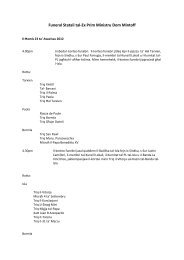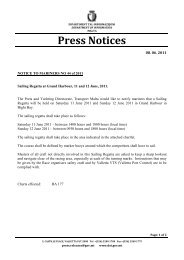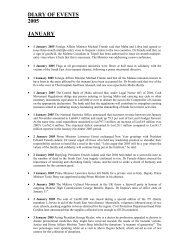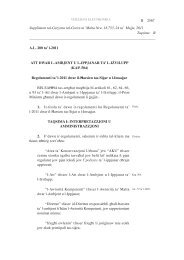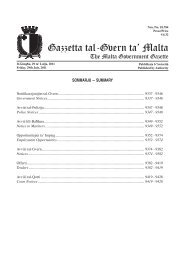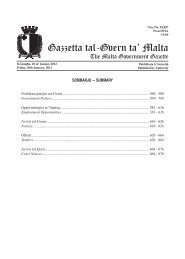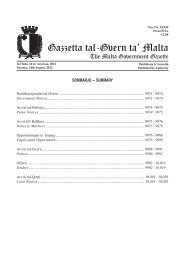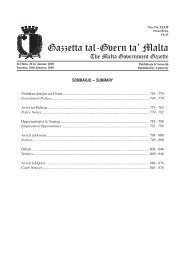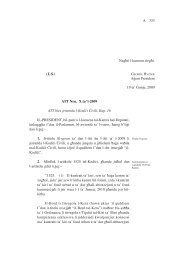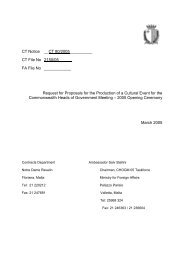Create successful ePaper yourself
Turn your PDF publications into a flip-book with our unique Google optimized e-Paper software.
Our Language<br />
Maltese were the first words coming from your lips and Maltese you spoke oh smiling boy. And<br />
that primary language grew with you and became one with your life...(translated from the poem<br />
Ghaliex - Why Dun Karm Psaila.)<br />
The Acts of the Apostles give a first inkling as to what the Maltese<br />
used as a language. The Maltese who welcomed St. Paul on the<br />
Islands were described as barbarians, which in those days meant<br />
people who did not speak Greek or Latin. Most likely they spoke<br />
Punic – that is to say Phoenician and Carthaginian. Hundreds of years<br />
later (AD 832) under Arabic rule, the language imbued the Arabic<br />
dialect. This was retained even after the expulsion of the Moslems<br />
(but not the Arabs) back in 1249. From that year onwards however<br />
one cannot refer to the Arabic articulated in Malta (like the Arabic<br />
conversed in Tunisia or Egypt) but to the Maltese language itself. This<br />
is the point in time where the Maltese language cut off its nexus and<br />
began to reckon with southern Europe particularly Sicily and Italy.<br />
Thus a language, in essence Arabic (having ties with Aramaic used in<br />
Lebanon and Syria), became the parlance of a Catholic and European<br />
community. Maltese continued to be influenced by Romance<br />
elements and this infusion continued throughout the hundreds of<br />
years to come.<br />
The Language Dispute gave rise to a<br />
contention whether Maltese should be<br />
written in Roman letters or go it alone<br />
and use different alphabetical letters.<br />
A definitive resolution was given in 1924<br />
by l-Għaqda tal-Kittieba Maltin (Maltese<br />
Writers Association) in its publication<br />
It-Tagħrif fuq il-Kitba Maltija (Facts on<br />
Maltese Writing) based on rules worked<br />
out by Mikiel Anton Vassalli in 1791.<br />
Scholars felt the need to study and analyse the Maltese language. The<br />
first study of its kind was published in 1750, Della Lingua Punica by<br />
Ġan Franġisk Agius de Soldanis. The Mylsen, the first major grammar<br />
on the language was published by Mikiel Anton Vassalli in 1791, who<br />
also published the first ever Maltese dictionary, Ktieb il-Kliem Malti,<br />
back in 1796.<br />
In the mid-1900s, the first language groups came into being with the<br />
best authors at that time giving their due to create the first literary<br />
movement. Ludovik Mifsud Tommasi and Ġan Anton Vassallo were<br />
among the first to delve into religious and patriotic poetry and gained<br />
huge popularity.<br />
The Language Dispute established Maltese and <strong>English</strong> as the official<br />
languages in 1934. Maltese is now also one of the official languages of<br />
the European Union.<br />
Recently, mainly because of the interaction with the British<br />
and as a result of modern day developments, <strong>English</strong><br />
words acceded into the Maltese language.<br />
The Maltese Language Act (Chapter 470), enacted<br />
unanimously by the House of Representatives in 2005,<br />
set up the National Council of the Maltese Language with<br />
the function and duty to update and promote the Maltese<br />
language.



